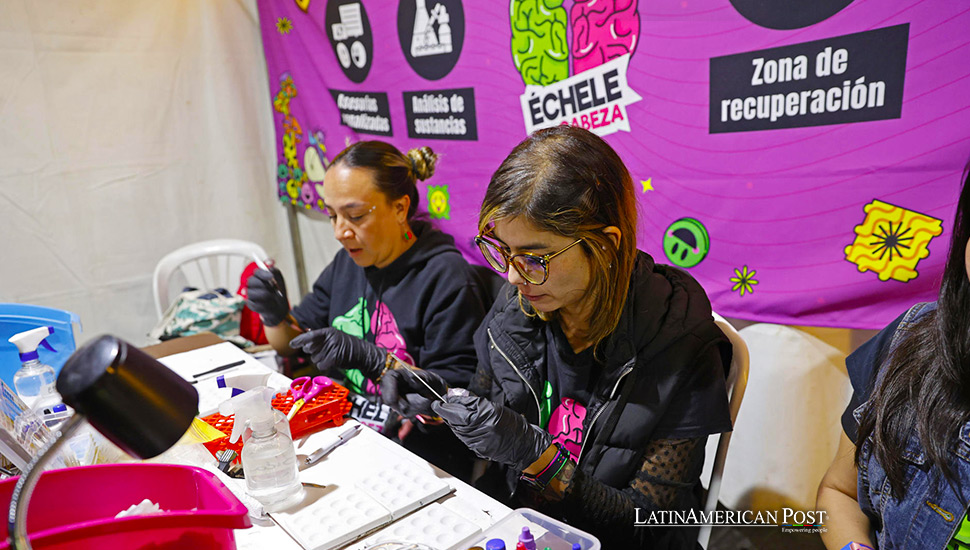Colombia’s Harm Reduction Plan at Music Festivals

In Colombia’s spirited music festivals, Échele Cabeza pioneers a transformative approach to drug use. Offering harm reduction services that echo across Latin America, she challenges long-standing policies and shapes a new narrative of compassionate drug intervention.
Fostering Safer Festivals: Échele Cabeza’s Impact in Colombia
In Colombia, amidst the vibrant beats and pulsating lights of youth music festivals, drugs like ecstasy, methamphetamines, mushrooms, and ‘pink cocaine’ (tusi) are not uncommon. The emergence of Échele Cabeza, a program dedicated to mitigating the risks associated with these substances, underscores a broader Latin American trend towards informed decision-making and harm reduction among the youth. At Bogotá’s Estéreo Picnic, the nation’s premier festival, Échele Cabeza sets up a tent where experts analyze substances that attendees plan to use, providing advice and promoting safer consumption practices.
This initiative reflects a growing awareness across Latin America of the need to address drug use pragmatically and compassionately. Countries like Uruguay, with its progressive cannabis policies, and Mexico, where debates around drug decriminalization are intensifying, mirror the shift towards harm reduction strategies. These approaches prioritize public health and informed choices over punitive measures, acknowledging the complex socio-economic and cultural factors driving drug use in the region.
In Colombia, where the drug trade has long been a contentious issue, programs like Échele Cabeza represent a significant step forward. By offering substance analysis and education at popular events, they challenge the stigma surrounding drug use and advocate for a regulated market that can ensure consumer safety. The program’s popularity at festivals like Estéreo Picnic, where it handles thousands of substance tests and consultations, illustrates a crucial demand for such services among the youth.
The Latin American context, with its diverse drug policies ranging from strict prohibition to progressive legalization, provides a rich backdrop for understanding the significance of harm reduction initiatives. Countries grappling with the consequences of the war on drugs are increasingly recognizing the benefits of harm reduction, which seeks to minimize the adverse health, social, and economic impacts of drug use without necessarily eliminating it.
Institutional Support: Échele Cabeza’s Growing Influence
Échele Cabeza’s success in Colombia has sparked interest from government officials and international observers alike. Its collaboration with the Ministry of Justice highlights the growing institutional support for harm reduction as a viable alternative to traditional drug control measures. This partnership lends credibility to the initiative and opens doors for further advancements in drug policy reform and public health strategies.
The program’s focus on popular substances like ecstasy, MDMA, tusi, and psychedelics reflects the changing drug consumption patterns in Colombia and across Latin America. By addressing the realities of contemporary drug use, Échele Cabeza and similar initiatives are at the forefront of a paradigm shift in drug policy, emphasizing education, safety, and respect for individual choices.
Moreover, the involvement of the youth in these programs, both as participants and as advocates, signifies a generational change in attitudes toward drugs and harm reduction. Young people in Latin America are increasingly rejecting the punitive narratives of the past, advocating for policies that recognize the complexity of drug use and prioritize human dignity and health.
As Latin America continues to navigate the challenges of drug policy and harm reduction, initiatives like Échele Cabeza serve as critical models for integrating scientific analysis, public health principles, and cultural sensitivity. Their work not only saves lives and reduces drug-related harm but also contributes to a more informed and compassionate approach to drug use in the region.
Also read: Colombia’s Street Art and the Transformation of Public Spaces
The rise of harm reduction programs like Échele Cabeza in Latin America’s music festivals represents a significant shift towards more humane and effective drug policies. By providing critical services and advocating for informed choices, these initiatives are paving the way for a future where drug use is understood as a complex issue requiring nuanced and compassionate responses.




